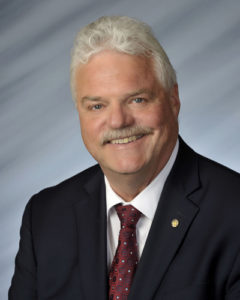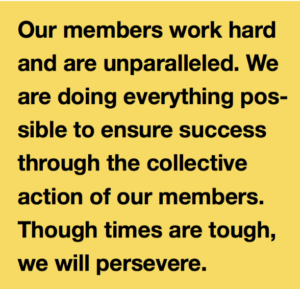These are going to be tough times for working people. Regardless of your party affiliation and allegiances, state and national activity point to a rough ride for those of us who get up, go to work, put in an honest day’s work and hope to return home to our family safely.
Despite the rhetoric we’ve been hearing from all parties about support for working families, actions speak louder than words.
Since January, a number of state legislatures have moved aggressively to reduce the power of working people and their unions. So called “right-to-work” is the law in more than half the states with the recent passage in Missouri. A national “right-to-work” bill is now before Congress.

Iowa lawmakers ripped up their collective bargaining law to prevent public sector workers from bargaining over healthcare, retirement, or vacations, and excluding almost all workplace issues other than wages.
In Washington, DC, legislation has been introduced to repeal the Davis-Bacon Act requiring workers be paid prevailing wages on federal infrastructure and construction projects.
All of these legislative actions go against the interests of workers and, ultimately, the nation.
It is no accident that these attacks are taking place now, when there is a surge of support for unions. According to a January survey conducted by the nonpartisan Pew Research Center, 60% of American adults have a favorable view of labor unions. In a positive sign for the future, 75% of young people aged 18 to 29 view unions favorably. And in another recent poll, unorganized professionals showed strong support for unions (see page 9).
Utility workers are first responders. That’s part of our DNA. We all know what it takes to effectively respond to emergencies — preparation, training and teamwork.
I am confident we will emerge from this tumultuous period stronger than ever because we are prepared to do so.
Over the last decade, we put in place the necessary tools to defend our gains and lift others up to join the middle class. Our two-way communications with local officers and rank-and-file members is better than ever. The National staff is fully engaged with local leadership. And our collective bargaining agreements, though difficult to negotiate, remain second to none.
Through our Power for America program we are taking control of training to ensure our members are prepared to take on the challenges of our rapidly changing industries. Our Utility Workers Military Assistance Program is putting veterans to work in good jobs.
Working more closely with our brothers and sisters in other labor unions, we are building a solid network to defend our gains and plant seeds for the future.
We also continue to build relationships within the industry. My recent talk with Edison Electric Institute CEOs was a first. They are interested in working together because, like us, they understand that in order to move the ball forward, we have to come to the table as equals.
We are working with employers in several states to protect our members’, and the public’s, interests. In Michigan, we played a critical role in maintaining the energy infrastructure through our support for the Nofs-Proos legislation. And in Ohio, we are working with employers to protect our members’ jobs and grid reliability.
There are no easy answers, no silver bullets, to address the crises our industries, and our nation, face. Our members work hard and are unparalleled. We are doing everything possible to ensure success through the collective action of our members. Though times are tough, we will persevere.

